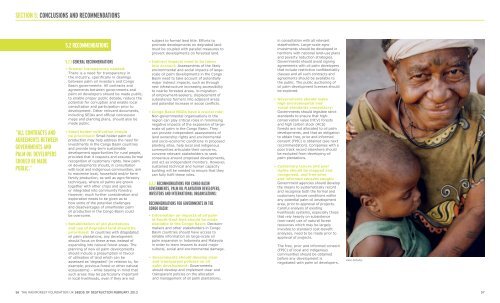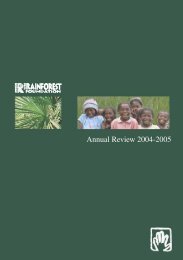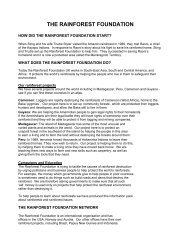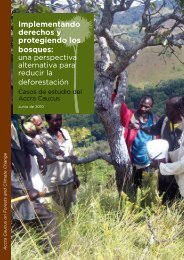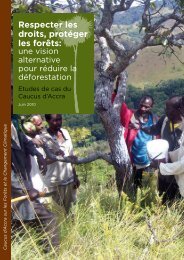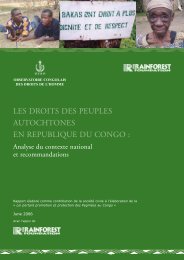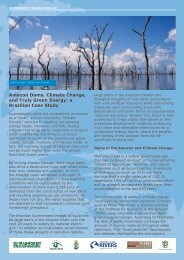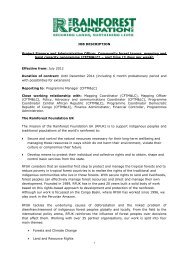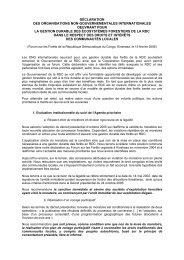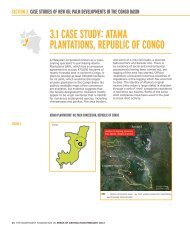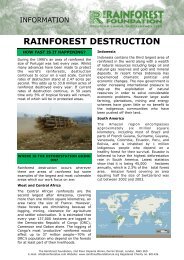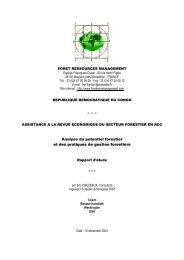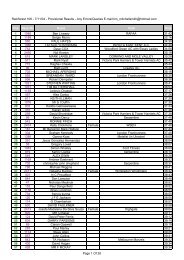Seeds of Destruction - Rainforest Foundation UK
Seeds of Destruction - Rainforest Foundation UK
Seeds of Destruction - Rainforest Foundation UK
You also want an ePaper? Increase the reach of your titles
YUMPU automatically turns print PDFs into web optimized ePapers that Google loves.
SECTION 5: CONCLUSIONS AND RECOMMENDATIONS<br />
“All contracts and<br />
agreements between<br />
governments and<br />
palm oil developers<br />
should be made<br />
public.”<br />
5.2 RECOMMENDATIONS<br />
5.2.1 GENERAL RECOMMENDATIONS<br />
• Greater transparency needed:<br />
There is a need for transparency in<br />
the industry, specifically in dealings<br />
between palm oil investors and Congo<br />
Basin governments. All contracts and<br />
agreements between governments and<br />
palm oil developers should be made public,<br />
to enable proper public debate, reduce the<br />
potential for corruption and enable local<br />
consultation and participation prior to<br />
development. Other relevant documents,<br />
including SEIAs and <strong>of</strong>ficial concession<br />
maps and planting plans, should also be<br />
made public.<br />
• Small holder cultivation should<br />
be prioritised: Small holder palm oil<br />
production may help address the need for<br />
investments in the Congo Basin countries<br />
and provide long-term sustainable<br />
development opportunities for rural people,<br />
provided that it respects and ensures formal<br />
recognition <strong>of</strong> customary rights. New palm<br />
oil developments should, in consultation<br />
with local and indigenous communities, aim<br />
to maximise local, household and/or farm<br />
family production, as well as agro-forestry<br />
techniques, where oil palms are grown<br />
together with other crops and species<br />
or integrated into community forestry.<br />
However, much further consideration and<br />
exploration needs to be given as to<br />
how some <strong>of</strong> the potential challenges<br />
and disadvantages <strong>of</strong> smallholder palm<br />
oil production in the Congo Basin could<br />
be overcome.<br />
• Rehabilitation <strong>of</strong> old plantations<br />
and use <strong>of</strong> degraded land should be<br />
prioritised: In countries with dilapidated<br />
oil palm plantations, any development<br />
should focus on these areas instead <strong>of</strong><br />
expanding into natural forest areas. The<br />
planning <strong>of</strong> new oil palm developments<br />
should include a presumption in favour<br />
<strong>of</strong> utilisation <strong>of</strong> land which can be<br />
assessed as ‘degraded’ (in relation to, for<br />
example, previous forest or other natural<br />
ecosystems) – while bearing in mind that<br />
such areas may be particularly important<br />
in local livelihoods, even if they are not<br />
subject to formal land title. Efforts to<br />
promote developments on degraded land<br />
must be coupled with parallel measures to<br />
prevent developments on forested land.<br />
• Indirect impacts need to be taken<br />
into account: Assessments <strong>of</strong> the likely<br />
environmental and social impacts <strong>of</strong> largescale<br />
oil palm developments in the Congo<br />
Basin need to take account <strong>of</strong> potentially<br />
major indirect impacts, such as through<br />
new infrastructure increasing accessibility<br />
to nearby forested areas, in-migration<br />
<strong>of</strong> employment-seekers, displacement <strong>of</strong><br />
subsistence farmers into adjacent areas<br />
and potential increase in social conflicts.<br />
• Congo Basin NGOs have a crucial role:<br />
Non-governmental organisations in the<br />
region can play critical roles in minimising<br />
negative impacts <strong>of</strong> the expansion <strong>of</strong> largescale<br />
oil palm in the Congo Basin. They<br />
can provide independent assessments <strong>of</strong><br />
land ownership rights and environmental<br />
and socio-economic conditions in proposed<br />
planting sites, help local and indigenous<br />
communities articulate their concerns,<br />
convene relevant stakeholders to seek<br />
consensus around proposed developments,<br />
and act as independent monitors. However,<br />
sustained technical and human capacity<br />
building will be needed to ensure that they<br />
can fully fulfil these roles.<br />
5.2.2 RECOMMENDATIONS FOR CONGO BASIN<br />
GOVERNMENTS, PALM OIL PLANTATION DEVELOPERS,<br />
INVESTORS AND INTERNATIONAL ORGANISATIONS:<br />
Recommendations for governments in the<br />
Congo Basin:<br />
• Information on impacts <strong>of</strong> oil palm<br />
in South-East Asia should be made<br />
available in the Congo Basin: Decisionmakers<br />
and other stakeholders in Congo<br />
Basin countries should have access to<br />
reliable information on large-scale oil<br />
palm expansion in Indonesia and Malaysia<br />
in order to learn lessons to avoid major<br />
cultural, social and environmental damage.<br />
• Governments should develop clear<br />
and transparent policies on oil<br />
palm development: Governments<br />
should develop and implement clear and<br />
transparent policies on the allocation<br />
and management <strong>of</strong> oil palm plantations,<br />
in consultation with all relevant<br />
stakeholders. Large-scale agroinvestments<br />
should be developed in<br />
harmony with national land-use plans<br />
and poverty reduction strategies.<br />
Governments should avoid signing<br />
agreements with oil palm developers<br />
that include restrictive confidentiality<br />
clauses and all such contracts and<br />
agreements should be available to<br />
the public. The public auctioning <strong>of</strong><br />
oil palm development licenses should<br />
be explored.<br />
• Governments should make<br />
high environmental and<br />
social standards compulsory:<br />
Governments should legislate strict<br />
standards to ensure that highconservation<br />
value (HCV) forests<br />
and high carbon stock (HCS)<br />
forests are not allocated to oil palm<br />
developments, and that an obligation<br />
to obtain free, prior and informed<br />
consent (FPIC) is obtained (see next<br />
recommendation). Companies with a<br />
poor track record elsewhere should<br />
be excluded from developing oil<br />
palm plantations.<br />
• Customary tenure and user<br />
rights should be mapped and<br />
recognised, and free prior<br />
and informed consent sought:<br />
Government agencies should develop<br />
the means to systematically record<br />
and recognise both the formal and<br />
customary tenure conditions within<br />
any potential palm oil development<br />
area, prior to approval <strong>of</strong> projects.<br />
Careful analysis <strong>of</strong> existing<br />
livelihoods systems, especially those<br />
that rely heavily on subsistence<br />
(non-cash) use <strong>of</strong> natural forest<br />
resources which may be largely<br />
invisible to standard cost-benefit<br />
analyses, need to be made prior to<br />
approval <strong>of</strong> projects.<br />
The free, prior and informed consent<br />
(FPIC) <strong>of</strong> local and indigenous<br />
communities should be obtained<br />
before any development is<br />
negotiated with palm oil developers.<br />
Kate Eshelby<br />
56 THE RAINFOREST FOUNDATION <strong>UK</strong> SEEDS OF DESTRUCTION FEBRUARY 2013 57


